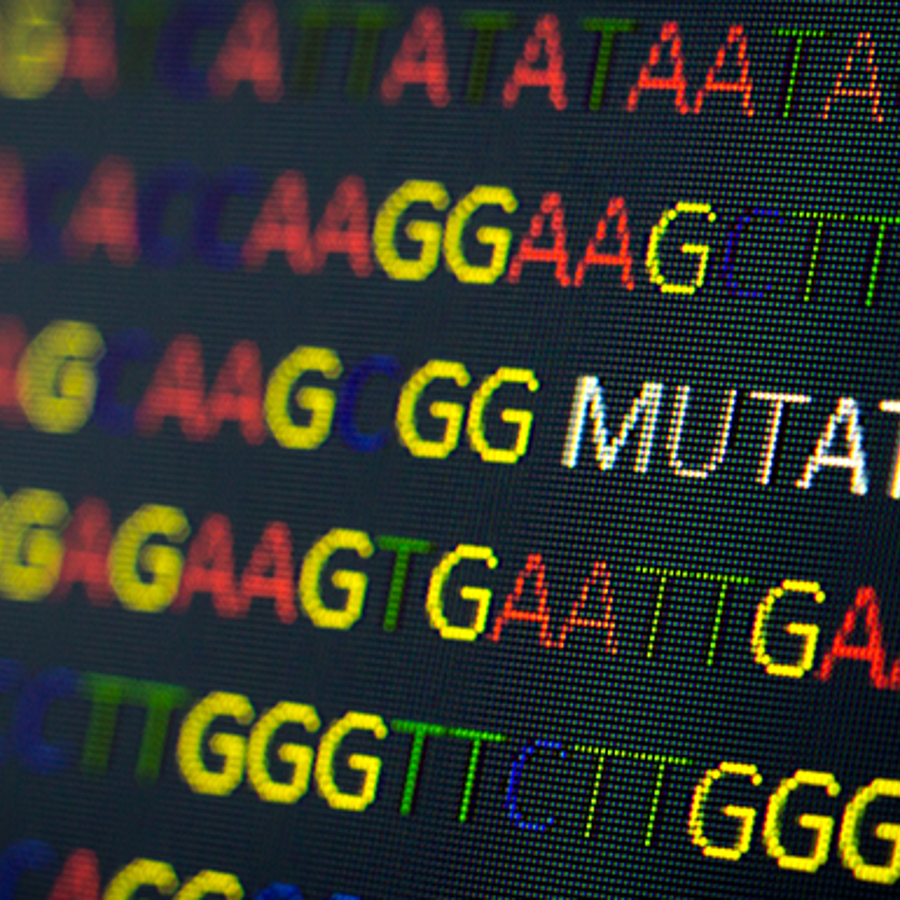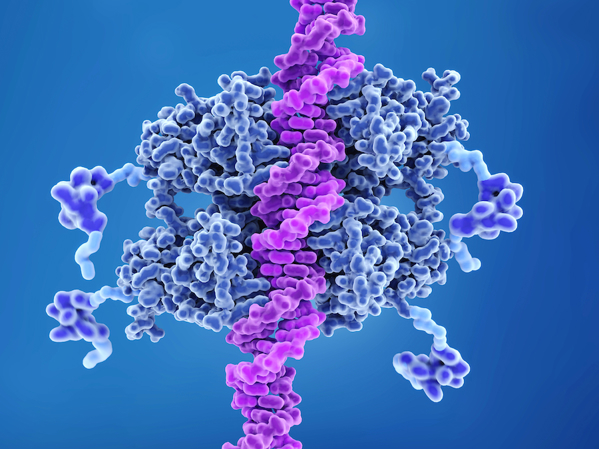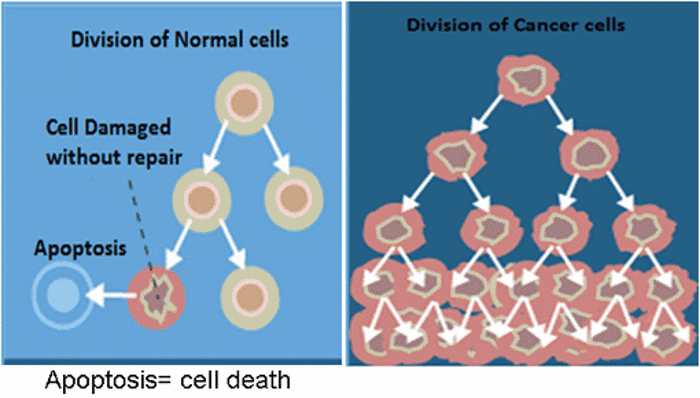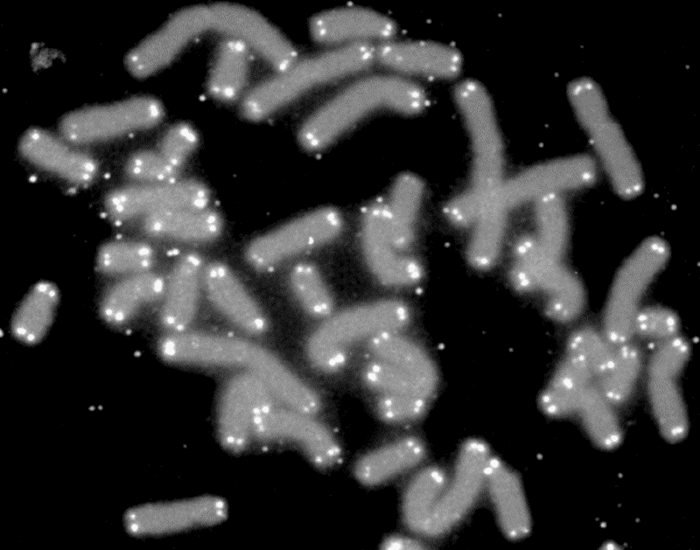
What mutations, in addition to p53, lead to cancer?
November 8, 2012

- Related Topics:
- Cancer,
- Mutation,
- Genetic conditions,
- Environmental influence
A curious adult from Arizona asks:
"What’s the latest with P53 mutations that are involved in the early onset of breast cancer and brain tumors (among others??). While some in my extended family have this mutation, fortunately I (and thus my kids) do not. Is it known what in addition to the P53 mutation is needed to cause these problems? For example, my uncle who clearly passed the gene on to two of his kids, did not have any problem (and died at age 90+)."
The p53 gene is one of the most important genes involved in cancer, so I’m glad you’ve asked about this one! The reason it is so important is because when it's working, it actually protects our bodies from tumors. Problems happen when this “guardian of the genome” (as scientists call it) is damaged so badly it can’t do its job.
Sometimes this damage happens during our lifetime. It’s usually caused by the environment or mistakes your cells make. This kind of damage is a big reason everyone is at some level of risk for getting cancer.

From your question, though, it sounds like you’re interested in a different kind of damaged p53 gene – the kind that runs in families. These are rare but can potentially be dangerous.
People with these dangerous differences in p53 have something called Li-Fraumeni syndrome. This disease causes an increased risk for brain cancer, breast cancer, leukemia, sarcomas and osteosarcomas (among others).
But, as in the case of your uncle, even if you have Li-Fraumeni syndrome, it’s not a certainty that you’ll get cancer. When you are born with one damaged p53, you still have to build up damage in other parts of your DNA to get cancer.
As I’ll describe below, many factors can influence your risk of building up a collection of genetic damage (or mutations) that will lead to cancer. These factors include things like:
- Your sex — men with Li-Fraumeni syndrome are less likely to get cancer
- The environment — how and where you live your life can affect the number of mutations you get
- Your generation in the family — there is a higher risk for cancer as the p53 mutation is passed through the generations
- Your luck — simple chance can affect how many new mutations you get
To understand why not everyone gets cancer and how these factors affect your risk, we need to take a step back and talk about what causes cancer. We’ll focus on how we have two copies of most of our genes and why in many cases both copies need to be damaged to cause cancer.
Double Jeopardy
Cancer is a bunch of cells in your body that have stopped following the rules. These cells will grow until they become a danger to your health. In the end you have to destroy them to survive.
Cells turn cancerous because of changes or mutations in the DNA of important genes. Genes are the directions for making you. They decide the color of your hair, your height, and lots of other things.
A key job of some genes is to make cells follow the rules. They essentially act like enforcers. When these enforcer genes break, the cells are free to go wild, with the end result being cancer.
The p53 gene is one of the key rule-enforcers. It is known as a ‘tumor suppressor’ because it is important in killing cells that have become potentially cancerous. If the p53 gene gets a damaging mutation, then p53 will stop doing it’s job to protect you from cancer.

People with Li-Fraumeni syndrome are born with a broken p53 gene. So in every cell of their body this key enforcer gene is not working well.
You might be wondering why people who are born with a mutated p53 gene don’t have cancer right out of the womb. It’s because we in fact have two copies of most of our genes, including p53. So people with Li-Fraumeni syndrome have a backup copy that can help keep cancer away.
These folks run into problems when the second copy breaks. One copy of p53 is enough to keep you healthy for a while. But if the second copy of p53 is broken then cancer will start to grow.
So what makes the second copy of p53 break in people with Li-Fraumeni syndrome? It gets broken like we talked about in the introduction – because of the environment or mistakes our cells make.
The environment can cause the second mutation the same way that the UV in sunlight can cause skin cancer or chemicals in cigarette smoke can cause lung cancer. Or, the second mutation can happen just by random chance if a cell in your body accidentally makes a mistake.
Your cells make these accidental mutations all the time when a cell is making more copies of itself. We just have to hope it doesn’t make the mistake in p53!
In fact, these kinds of mutations can happen to anyone. Most people that get cancer actually have both of their p53 gene copies mutated, just from random chance.
This is where cancer almost always comes from. It usually happens when people accumulate these types of mutations throughout their lifetime, from the environment or mistakes made by our cells.
However, people with Li-Fraumeni syndrome are at a disadvantage because they only need one more mutation in p53 to get cancer. This is why people with Li-Fraumeni get cancer at a higher rate and at an earlier age.
Risk Factors When You Have Li-Fraumeni Syndrome
But this still leaves a question — why do some people with Li-Fraumeni get cancer and others don’t? The science behind this question is still being researched, so I’ll try to give you the most up-to-date information.
As I said before, people with Li-Fraumeni syndrome need a second mutation in p53 in order to get cancer. In the case of people like your uncle who have a p53 mutation but don’t get cancer, it’s possible that they simply lucked out. This can happen sometimes, and it’s a lucky win for those who escape that second mutational hit!
There is also some evidence that the risk for cancer in a family with a Li-Fraumeni mutation can actually increase through the generations. In other words, a father with a Li-Fraumeni mutation will have a lower risk than his children with the same mutation.
We don’t know for sure why this is, but some scientists think it could be caused by telomere shortening1. This happens when the ends of the chromosomes (the telomeres) get shorter and shorter through the generations. This could be part of the explanation for why your uncle was cancer-free but his descendants may not have been as lucky.

Another thing that matters in cancer risk is the environment, or how and where you live your life. For example, your diet may play a role. There are experiments where mice born with a p53 mutation (like in Li-Fraumeni) have a lower risk for cancer when they are on a low-calorie diet2. This hasn’t yet been shown in humans, but environmental effects like these might impact whether someone with a p53 mutation gets cancer.
And then lastly, there is a difference between sexes. Where men with a p53 mutation have a 70% lifetime risk for cancer, women with the same mutation have a 90% risk for cancer3. This is most likely due to the fact that women are at a much higher risk for breast cancer. Perhaps your uncle was at a lower risk for cancer than any daughters he may have had.
So in conclusion, your sex, your generation in the family, your environment, and just luck can all play a role in your cancer risk when you are born with a p53 mutation. Scientists are working to find a way to offset these risks, so hopefully someday we will be able to reduce the rate of cancer in people with Li-Fraumeni syndrome.
Read More:
- Scitable: The two-hit hypothesis for tumor suppressor genes
- National Cancer Institute: A resource for understanding cancer risks
- Neural Academy: More about p53’s job as “guardian of the genome” (video)

Author: Zoe Assaf
When this answer was published in 2012, Zoe was a Ph.D. candidate in the Department of Genetics, studying evolution and genomics in Dmitri Petrov’s laboratory. She wrote this answer while participating in the Stanford at The Tech program.
 Skip Navigation
Skip Navigation
